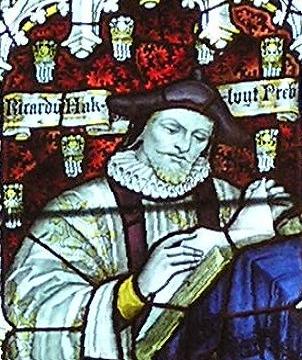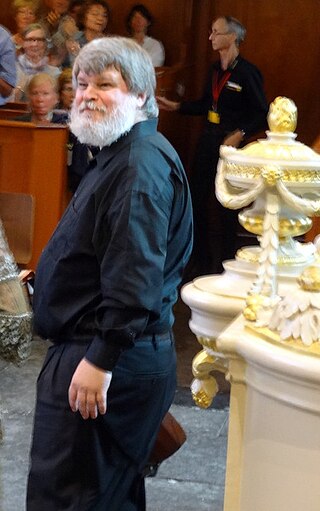
John Dowland was an English Renaissance composer, lutenist, and singer. He is best known today for his melancholy songs such as "Come, heavy sleep", "Come again", "Flow my tears", "I saw my Lady weepe", "Now o now I needs must part" and "In darkness let me dwell", but his instrumental music has undergone a major revival, and with the 20th century's early music revival, has been a continuing source of repertoire for lutenists and classical guitarists.

Thomas Campion was an English composer, poet, and physician. He was born in London, educated at Cambridge, studied law in Gray's inn. He wrote over a hundred lute songs, masques for dancing, and an authoritative technical treatise on music.

Richard Hakluyt was an English writer. He is known for promoting the English colonization of North America through his works, notably Divers Voyages Touching the Discoverie of America (1582) and The Principal Navigations, Voyages, Traffiques and Discoveries of the English Nation (1589–1600).

Julian Alexander Bream was an English classical guitarist and lutenist. Regarded as one of the most distinguished classical guitarists of the 20th century, he played a significant role in improving the public perception of the classical guitar as a respectable instrument. Over the course of a career that spanned more than half a century, Bream also helped revive interest in the lute.
Thomas Robinson was an English Renaissance composer and music teacher, who flourished around 1600. He taught and wrote music for lute, cittern, orpharion, bandora, viol, and voice.

Sir John Goss was an English organist, composer and teacher.
John Danyel or John Daniel was an English lute player and songwriter. He was born in Wellow, Somerset, and was the younger brother of poet Samuel Daniel. His surviving works include "Coy Daphne Fled", about the nymph Daphne and her fate, and "Like as the lute delights".

Paul Raymond O'Dette is an American lutenist, conductor, and musicologist specializing in early music.

Peeter van der Phaliesen, Latinised as Petrus Phalesius, French versions of name Pierre Phalèse and Pierre de Phaleys was a Flemish bookseller, printer and publisher. Aside from a number of literary and scientific works, his printing press is mainly known for its publications of music. Phalesius was the principal publisher of music active in the sixteenth-century Low Countries.
Charles Daniels is an English tenor, particularly noted for his performances of baroque music. He is a frequent soloist with The King's Consort, and has made over 25 recordings with the ensemble on the Hyperion label.

Nicolas Vallet was a French lutenist and composer who emigrated to the Dutch Republic.
John Alford may refer to:

Early music of Britain and Ireland, from the earliest recorded times until the beginnings of the Baroque in the 17th century, was a diverse and rich culture, including sacred and secular music and ranging from the popular to the elite. Each of the major nations of England, Ireland, Scotland, and Wales retained unique forms of music and of instrumentation, but British music was highly influenced by continental developments, while British composers made an important contribution to many of the major movements in early music in Europe, including the polyphony of the Ars Nova and laid some of the foundations of later national and international classical music. Musicians from the British Isles also developed some distinctive forms of music, including Celtic chant, the Contenance Angloise, the rota, polyphonic votive antiphons, and the carol in the medieval era and English madrigals, lute ayres, and masques in the Renaissance era, which would lead to the development of English language opera at the height of the Baroque in the 18th century.
John Forbes (c.1568–1634) was a Scottish minister exiled by James VI and I. He founded a Church of Scotland in Middelburg in the Netherlands. He was born about 1568, and was third son of William Forbes of Corse and Elizabeth, daughter of Alexander Strachan of Thornton. He graduated M.A. at St Andrews in 1583, and was settled in Alford in 1593. In November 1602 the General Assembly chose him as one of those whom the King might select for nominating commissioners from the various Presbyteries to Parliament. At Alford he came into conflict with the powerful sept of the Gordons, who were vigorous opponents of Protestantism, and when the Synods of Aberdeen and Moray excommunicated the Marquess of Huntly, and Huntly had appealed successfully to the Privy Council, Forbes was sent by these Synods to London to represent the case to King James. He was elected Moderator of the General Assembly of Aberdeen on 2 July 1605 contrary to the King's order. Of twelve Aberdeenshire ministers who were present ten afterwards admitted the illegal nature of the Assembly, but Forbes [and Charles Fearn, minister of Fraserburgh] having been summoned before the Privy Council, declined the Council's jurisdiction, on the ground that the Assembly had dealt wholly with spiritual matters. For this he was imprisoned at Blackness, tried for high treason, and banished the country. On 7 November 1606 he sailed from Leith for Bordeaux, and after spending a time with Boyd of Trochrig at Saumur, he proceeded to Sedan. Much of his work thereafter consisted in visiting the Reformed Churches and Universities on the Continent, in which were many Scots students and professors. In 1611 he became minister of the English congregation at Middelburg, Holland, and soon after he was offered release from his sentence, but upon conditions he could not accept. In 1616 he came to London, where he had an interview with the King, who promised to annul his banishment — a promise which was not fulfilled. In 1621 he was minister at Delft, but the hatred of his former ministerial brethren, some of whom were now bishops, instigated Laud and the English Government to procure his dismissal, and this was carried out in 1628. He died in Holland in 1634.
Adrian Le Roy (c.1520–1598) was an influential French music publisher, lutenist, mandore player, guitarist, composer and music educator.
John Angel, was an English priest. He sang as a lay clerk in the Choir of King's College, Cambridge after which he was appointed a Gentleman of the Chapel Royal and was present at the funeral of Edward VI, the coronation and funeral of Queen Mary and the coronation of Elizabeth I.
Robert Fills, was an English-French translator who translated works from French into English.

Jean-Baptiste Besard was a bisontin lutenist, composer and anthologist who lived and worked in the Holy Roman Empire. notable for publishing two anthologies which collected a diverse range of musical works of the Renaissance and early Baroque periods and included instructions on playing the lute.

John Halle, or John Hall of Maidstone was an English surgeon, known as a medical writer and poet.
John Attey was an English composer of lute songs or ayres.










